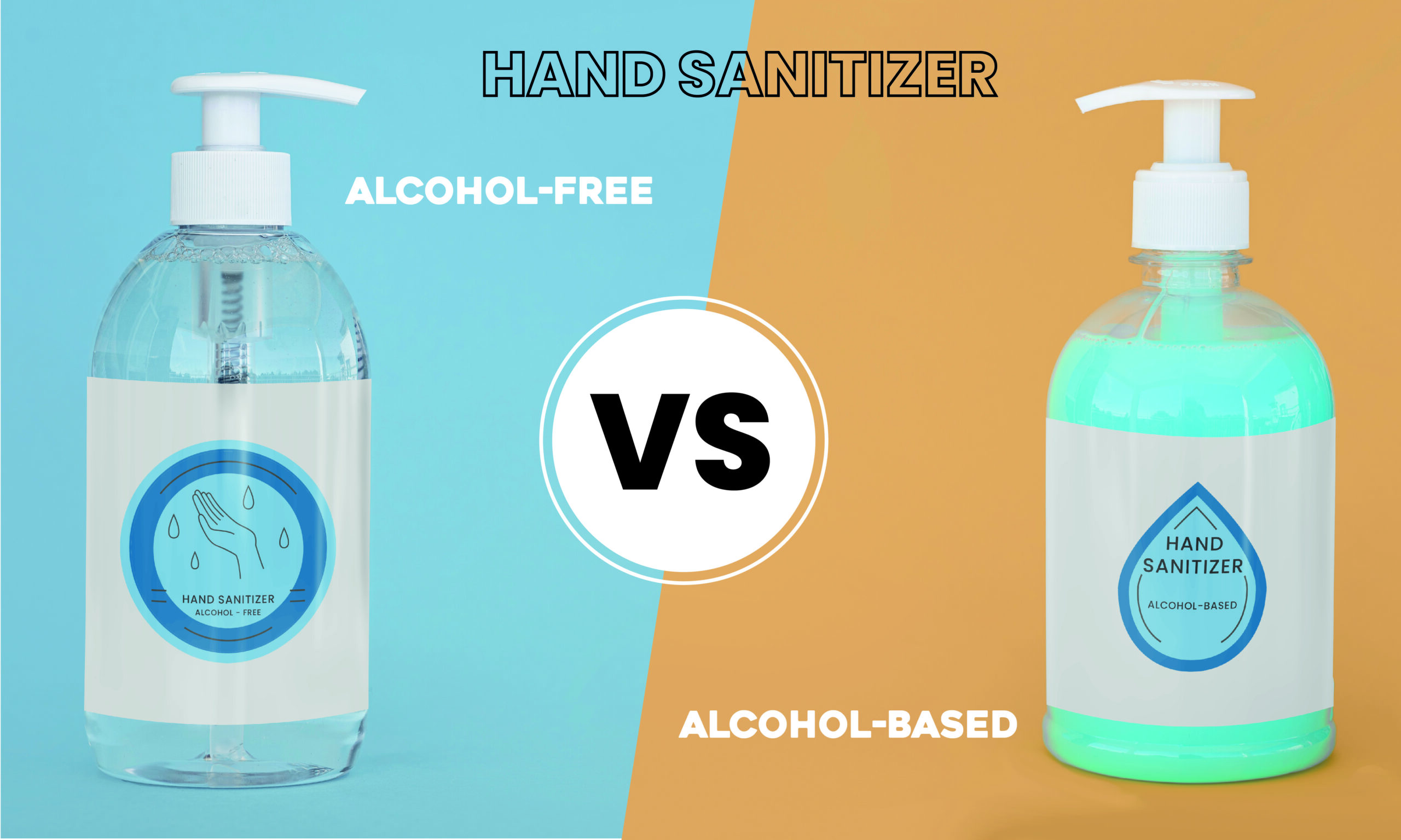- Home
- Health Center
- Health Info
- Hand Sanitizer: Alcohol-Based vs Non-Alcohol Based
COVID-19
Hand Sanitizer: Alcohol-Based vs Non-Alcohol Based


During the pandemic, there is increased awareness on hand hygiene to prevent the spread of the Coronavirus. The World Health Organization (WHO) has advocated the need of cleaning hands regularly to avoid transmission to surfaces by infected persons and from contaminated surfaces.1 However, when soap and water are not available, the best option to keep our hands clean is using a hand sanitizer. It has become an essential tool to keep ourselves, families, friends, and communities safe from those infectious viruses, bacteria, and germs.
In the present market, there are two main options available: Alcohol-based and non-alcohol based sanitizers. Potential users might pose questions such as:
- “Which hand sanitizer works the best to kill germs?”
- “Is alcohol-based sanitizer better than non-alcohol-based sanitizer?”
- “Which hand sanitizer is suitable for my sensitive skin?”
Let us break down for you the pros and cons of both types of hand sanitizer so that you can decide which one is right for you.2
Alcohol-based Sanitizer
Alcohol-based hand sanitizers usually contain active ingredients either alcohol (ethanol) or isopropyl alcohol. Their main difference is on a molecular level, but both ingredients are effective in destroying germs and bacteria. They work by breaking apart the lipid-based coatings of viruses and bacteria, destroying them.3 The FDA suggested hand sanitizers should contain between 60% to 95% alcohol concentration to achieve maximum efficacy.>4
Pros of Alcohol-based Sanitizer
- Favored by global leading health organizations such as WHO, FDA, and CDC as an alternative to hand washing.
- Clinical studies have proven their effectiveness against most known bacteria and viruses.5,6
- Alcohol-based sanitizers are the commonly used hand sanitizers in most hospital and healthcare settings.
Cons of Alcohol-based Sanitizer
- Potentially toxic upon ingestion. It might cause acute alcohol poisoning in both children and adults upon consumption.
- Repeated usage leads to dry and cracked skin. This happens when high concentrations of alcohol strip away the protective layer of oils on skin that retains moisture, leading to skin dryness or even increase the risk of skin irritation especially those having sensitive skin (eczema). Some hand sanitizers have added aloe vera extract and Vitamin E to reduce the incidence of dry skin.
- Highly flammable due to high concentration of alcohol.
- Ineffective if hands are greasy or heavily soiled.
Available Brands in CARiNG Pharmacy
- Netcare Instant Hand Sanitizer (Liquid, Spray, Liquid Spray, Gel, Foam)
- Shield Instant Hand Sanitizer
- Alsoft A Hand Sanitizer
- Septi-Sol Solution
- Softa-Man
- Dettol Instant Hand Sanitizer
- Lifebuoy Hand Sanitizer
- Chomel Hand Sanitizer, etc
Non-Alcohol Based Sanitizer
The non-alcohol hand sanitizers contain active ingredients Benzalkonium chloride, a type of quaternary ammonium compound (known as quats or QATs). Compared to alcohol-based hand sanitizers, most non-alcohol-based sanitizers consisted of less than 0.1% concentration of benzalkonium chloride and provided a comparable level of protection. The proposed mode of action is quite like an alcohol-based sanitizer in which benzalkonium chloride destroys both bacteria and viruses by breaking down their protective lipid coating.3
Pros of Non-alcohol Based Sanitizer
- Easier on hands and skin (does not dry out hands or easily irritate the skin)
- Not as harmful compared to alcohol-based sanitizer if accidentally ingested
- Non-flammable (low fire hazard due to absence of alcohol)
- Providing long-lasting protection on the skin surface even after the solution has dried up. A study shown that benzalkonium chloride can retain antibacterial activity on the skin up to 4 hours post-application, while alcohol sanitizer shown little effect only one hour post-application.7
- A recent study (2021) from Brigham Young University proposed alcohol-free products containing benzalkonium chloride or ammonium compounds can be effective alternatives to alcohol-based products to eliminate the Covid-19 virus with the short contact time.8
Cons of Alcohol-based Sanitizer
- Most non-alcohol sanitizers come in foam formulation which requires a special foaming mechanism in the dispenser (higher cost). However, foam formulation brings a more pleasing experience for the user.
- In spite of available evidence 9, non-alcohol based sanitizer requires further testing and recognition from leading global health organizations such as WHO and FDA
Available Brand in CARiNG Pharmacy
- Convoy Foam Sanitizer
Bottomline
Both types of hand sanitizer can provide conveniences and effectiveness against harmful germs including the Covid-19 virus. Consider both choices of our trusted allies for hand hygiene in the must-win fight against the outbreak of the Covid-19 pandemic.
If you have further inquiries about the hand sanitizer, you may consult our pharmacist at any CARiNG Pharmacy stores or message us on our Facebook page. Until then, stay safe and healthy everyone!
References
- WHO Guidelines on Hand Hygiene in Health Care: a Summary. World Health Organization. (Web accessed August 2021). Web Link: https://www.who.int/gpsc/5may/tools/who_guidelines-handhygiene_summary.pdf
- Hand Sanitizer Use Out & About. Centers for Disease Control and Prevention (CDC). (Web accessed August 2021). Web Link: https://www.cdc.gov/handwashing/hand-sanitizer-use.html
- Hand sanitizers: A review of ingredients, mechanisms of action, modes of delivery, and efficacy against coronaviruses. Golin, A. P., Choi, D., & Ghahary, A American journal of infection control, 48(9), 1062–1067
- Q&A for Consumers. Hand Sanitizers and Covid-19. U.S. Food and Drug Administration (FDA). ). (Web accessed August 2021). Web Link: https://www.fda.gov/drugs/information-drug-class/qa-consumers-hand-sanitizers-and-covid-19
- Inactivation of Severe Acute Respiratory Syndrome Coronavirus 2 by WHO-Recommended Hand Rub Formulations and Alcohols. Kratzel, A., Todt, D., V’kovski, P., Steiner, S., Gultom, M., Thao, T., Ebert, N., Holwerda, M., Steinmann, J., Niemeyer, D., Dijkman, R., Kampf, G., Drosten, C., Steinmann, E., Thiel, V., & Pfaender, S. (2020). Emerging infectious diseases, 26(7), 1592–1595
- Inactivation of SARS-CoV-2 by commercially available alcohol-based hand sanitizers. Leslie, R. A., Zhou, S. S., & Macinga, D. R. (2021) American journal of infection control, 49(3), 401–402
- Demonstrating the persistent antibacterial efficacy of a hand sanitizer containing benzalkonium chloride on human skin at 1, 2, and 4 hours after application. Bondurant, S. W., Duley, C. M., & Harbell, J. W. American journal of infection control, 47(8), 928–932
- Alcohol-free hand sanitizer and other quaternary ammonium disinfectants quickly and effectively inactivate SARS-CoV-2. Ogilvie, B. H., Solis-Leal, A., Lopez, J. B., Poole, B. D., Robison, R. A., & Berges, B. K. The Journal of hospital infection, 108, 142–145
- Safety and effectiveness for health care antiseptics: Topical antimicrobial drug products for over-the-counter human use. U.S. Food and Drug Administration (FDA). (Web accessed August 2021). Web Link: https://www.federalregister.gov/documents/2017/12/20/2017-27317/safety-and-effectiveness-of-health-care-antiseptics-topical-antimicrobial-drug-produc
Tags
Latest Health Info
Gut and Skin: How They Are Related?
Ladies, Let’s Bring Out The Beauty In You As women juggle the demands of work, family, and personal health, taking ...
Ladies, Let’s Bring Out The Beauty In You
Ladies, Let’s Bring Out The Beauty In You As women juggle the demands of work, family, and personal health, taking ...
Healthy Weight, Happy Joints
How Does Weight Affect Knee Health? The Link Between Pounds And Pain Osteoarthritis (OA) involves the degeneration of joints, which ...



